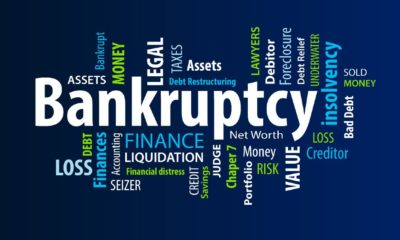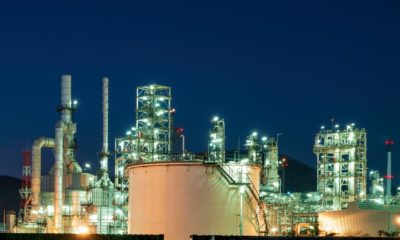Bankruptcy
Oil Price Improvements Aren’t Stopping Bankruptcy Surge in U.S. Energy Companies

Crude oil prices have recovered, hovering around $50 per barrel.
Yet, this has not seemed to help the growing bankruptcy problem in the current energy economy.
Sixty oil and gas companies have now filed for bankruptcy, and many of these have been smaller companies without the economic cushion enjoyed by many larger corporations.
In 2014, crude oil prices were at $100 per barrel, so this “improvement” is still extremely low compared to past numbers.
However, it is much higher than February’s very low $20. The number has been fluctuating over the past month before finally stabilizing at its current price.
Investors don’t predict the price rising much anywhere in the near future.
Which Companies are Experiencing or At Risk for Bankruptcy?
Exco, a prominent energy company, filed bankruptcy on Friday. They are one of many companies currently looking at alternatives to settle their bankruptcy disputes both in and out of court.
Magnum Hunter Resources’ Hunter Evans stated in an interview that although oil companies can survive low prices for a while, withdrawal of investment creates an unbearable cost burden which has led many companies to declare bankruptcy.
Other companies that filed bankruptcy (or stated it looks quite likely for their business) in the past few days include:
- Penn Virginia Corporation
- Linn Energy
- Sandridge Energy
What to do About These Huge Debt Loads?
Many companies like Linn went into extreme debt to build their companies, with the expectation that oil prices would remain stable.
The structure of growth plans such as these has led the businesses to be less resilient in the face of changing prices.
Wilbur Ross and John Wilder of Exco have reported losses for five consecutive quarters.
Many companies have stated that their potential rebound plans include possibly making debtholders into shareholders in an attempt to alleviate some of their debt obligations. They hope that this restructuring will enable them to bounce back from their financial strains currently and become more stable throughout future fluctuations.
Why is Bankruptcy Increasing while Prices are Rising?
Many have wondered why bankruptcy claims keep coming in despite rising oil prices.
Unfortunately, much of the damage due to low oil prices to these companies has already been done. Despite the rise of oil prices for three straight days, much of the damage is long-term and cannot be helped by a short-term improvement.
Many investors have pulled out of these companies and put their funds into more promising industries, and it will be nearly impossible to win back many of these investors.
Once investors doubt their investments, they do not usually reenter the same market.
The combined cost of oil companies filing for bankruptcy since the beginning of the 2015 tax year is over $44 billion total.
Many companies struggle with extremely high debt loads, such as Sandridge Energy, currently owing $4.13 billion. W&T Offshore Inc. also is near $1.5 billion in debt.
These levels of debt can lead to irrecoverable damage to the company, loss of property, investment, and important infrastructure and land access for the company.
It is expected that many large corporations who did not suffer as much from the price decline will begin to become profitable again at current price levels. Many of these companies were able to use their scope and reputation to maintain investors more easily than smaller, lesser known companies.
However, it also takes time and a lot of resources to keep changing production levels as oil prices fluctuate.
This causes even higher prices sometimes than if the company just maintained low levels of production.
[ms_divider style=”normal” align=”left” width=”100%” margin_top=”30″ margin_bottom=”30″ border_size=”5″ border_color=”#f2f2f2″ icon=”” class=”” id=””][/ms_divider]
[ms_featurebox style=”4″ title_font_size=”18″ title_color=”#2b2b2b” icon_circle=”no” icon_size=”46″ title=”Recommended Link” icon=”” alignment=”left” icon_animation_type=”” icon_color=”” icon_background_color=”” icon_border_color=”” icon_border_width=”0″ flip_icon=”none” spinning_icon=”no” icon_image=”” icon_image_width=”0″ icon_image_height=”” link_url=”https://offers.thecapitalist.com/p/58-billion-stock-steal/index” link_target=”_blank” link_text=”Click Here To Find Out What It Is…” link_color=”#4885bf” content_color=”” content_box_background_color=”” class=”” id=””]This one stock is quietly earning 100s of percent in the gold bull market. It's already up 294% [/ms_featurebox]
[ms_divider style=”normal” align=”left” width=”100%” margin_top=”30″ margin_bottom=”30″ border_size=”5″ border_color=”#f2f2f2″ icon=”” class=”” id=””][/ms_divider]
Looking Into the Future of Oil
Oil executives have publicly stated that, for the industry to be able to make a total and complete recovery on a decent timescale, oil prices need to be stable. If stability can be maintained for many weeks, even if the price does not necessarily rise, oil companies can stabilize their production levels and start becoming more profitable.
However, it doesn’t seem like this sort of stabilization will happen very soon.
There is currently a lot of uncertainty in Europe about Greece and Britain’s roles in the European Union, and this uncertainty makes foreign investors more hesitant to put stock in oil companies. Oil’s value also is impacted by larger scale market changes, so if a significant change in the European economic structure occurred, it would have worldwide implications for investors.
There is also global uncertainty about China which could impact oil companies’ success and revitalization. China’s market increased by 150% last year due to a belief hat their government reforms would successfully restructure the economy.
But, this growth and the subsequent stagnation has led to widespread fear of a potential bubble burst in the Chinese investment market. Many economists believe they are in the works for a huge economic crash in the next few years.
Again, this possible change in the global market makes many investors hesitant to make big investment changes in markets which may already be declining or unstable.















